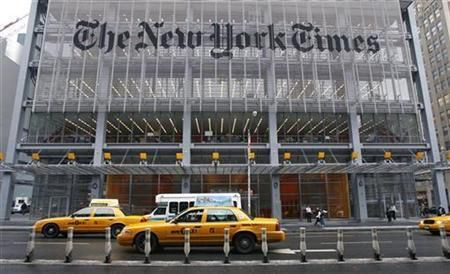Drone Base Blackout: Is The New York Times Too Cozy With The Obama Administration?

The plot has thickened in the convoluted story of a media blackout concerning a secret U.S. military base in Saudi Arabia. On Wednesday, the New York Times and the Washington Post published stories examining what the Times described as the U.S. military’s “quasi-secret campaign of targeted killings” of suspected insurgents in the Middle East, the day before John O. Brennan, who is primarily responsible for orchestrating the drone war and whom the president has nominated as CIA director, appeared for his confirmation hearing before the Senate Intelligence Committee.
The Post and the Times stories revealed the existence of what they both described as a secret drone base in Saudi Arabia, suggesting – but not saying explicitly -- in accompanying editorials that theirs were the first reports revealing the existence of that base, which launched the drones responsible for killing American-born al Qaeda operative Anwar al-Awlaki and his 16-year-old son, both U.S. citizens.
The Post announced in a story addressing criticism of the assassinations “that another news organization was planning to reveal the location of the base, effectively ending an informal arrangement among several news organizations that had been aware of the location for more than a year.” Presumably, that other news organization was the Times, which conceded to having previously kept the information confidential at the request of the CIA. On her blog, Times public editor Margaret Sullivan defended the disclosure of the drone base while gently challenging the Times’ decision to honor the government’s request for secrecy until now. Sullivan had queried Times managing editor Dean Baquet, who explained that the administration had been concerned that revealing the existence of the base could hinder counterterrorism efforts. But with Brennan as a candidate for CIA head, the Saudi Arabian drone base “was central to the story,” Baquet said.
Later Wednesday, Gawker’s Adrien Chen (of Redditor pedophile-outing fame) pointed out that two other publications had long before reported on the “secret” Saudi drone base: In 2011, first the Times of London and then Fox News --both properties of the conservative Rupert Murdoch, by the way -- reported on the existence of a drone base in Saudi Arabia, though Fox had since changed the language of the story to replace mentions of Saudi Arabia with “Arabian Peninsula.”
According to Chen, this discovery rendered completely illegitimate the claims by the Post and New York Times that a media blackout was the result of security concerns.
“In cooperating with the blackout, news organizations weren't protecting a state secret: They were making the CIA's life easier by suppressing a story that was already out there,” Chen insisted. “One which may have embarrassed their Saudi hosts, whose citizens might rightly be concerned that their soil was the launching pad for attacks in Yemen.”
Sullivan’s post appears to acknowledge, however vaguely, the existence of previous reports: “In past stories, [Baquet] said, the location of the base ‘was a footnote.’” Where these “past stories” were published was left ambiguous – perhaps intentionally, thought that is not typically Sullivan’s style as the Times’ internal watchdog.
It does seem that the Times, in defending its decision to publish the information, was also congratulating itself for reversing its judgment in favor of its readers, with Baquet boasting that “we don’t ask for permission” from the government.
But critics within the media, many from overseas and conservative pockets of the U.S., are not buying the picture the Times is painting of having stood up to the government. On the contrary, there is a pronounced suspicion from some that the New York Times, the Washington Post and the other supposedly left-leaning news outlets who were parties to the so-called “informal agreement” are indulging the Obama administration with courtesies they never would have extended the government during the Bush years. Noel Shepperd wrote for the conservative news blog NewsBusters that “media complicity in President Obama's drone strategy gets more and more astonishing with each passing day.” Shepperd later juxtaposed the media blackout against Dana Priest’s 2006 Pulitzer Prize-winning Washington Post story that exposed covert prison locations where suspected al-Qaeda operatives were being interrogated and a New York Times story about Bush-era domestic surveillance, which was also awarded a Pulitzer.
In the UK, the Guardian reprimanded the Times and the Post even more harshly and more inclusively, in an article titled “U.S. Media yet again conceals newsworthy government secrets,” which charges bipartisan censorship. It cited examples of U.S. media outlets sitting on stories potentially damaging to both the Obama and Bush administrations. A second article quoted a professor of journalism and communication at Pennyslvania’s Lehigh University who felt that the decision to withhold the drone base location was indefensible.
"The decision not to publish is a shameful one,” Dr. Jack Lule told the Guardian. “The national security standard has to be very high, perhaps imminent danger," in order to justify such protections, he said. "The fact that we are even having a conversation about whether it was a national security issue should have sent alarm bells off to the editors. I think the real reason was that the administration did not want to embarrass the Saudis – and for the U.S. news media to be complicit in that is craven."
Indeed, Sullivan appears to have heard the alarm bells loud and clear. On Thursday, she retweeted the Guardian stories, endorsing them as “strongly argued on media self-censorship.” Sullivan also said she would be addressing the various concerns raised by this story and other critics in Sunday’s blog post.
© Copyright IBTimes 2024. All rights reserved.












